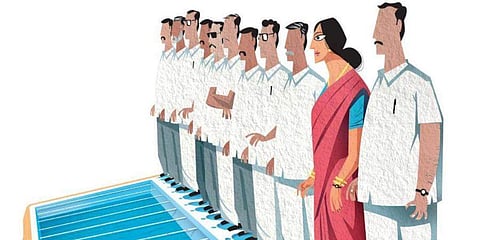

Half is Us. Half is Ours. This is the theme of the short film that was produced by Shakti, a citizens group and released ahead of the elections in Tamil Nadu, West Bengal and Assam. The organisation and the film campaigns for appropriate representation of women in our parliament. The film asks why we have less than one woman for every ten men that represent the Indian population in the parliament.
Shakti: Political Power to Women, describes itself as a 'public pressure group', with the long-term objective of enabling more women to be elected as MLAs and MPs. The team at Shakti has been behind many initiatives to spread awareness about the importance of female politicians like poll surveys, campaigns and pressuring/encouraging parties to give election tickets to more women. They have also been working on the ground to encourage women to participate in elections and are working on the implementation of the women’s reservation bill. The decision to produce this film was the organisation’s attempt to reach a wider audience and it seems to already be doing a fantastic job of it.
Watch the film here —
Tara Krishnaswamy, the co-founder of Shakti says that the team was inspired by the anti-smoking, open defecation ads and decided that a public service announcement on the importance of women in politics could go a long way. Tara says that they decided that the film should be less than a minute long and should be able to be forwarded easily on platforms like WhatsApp. “It should reach the very last man in the line. That was our motto,” Tara says. Since men do not understand what it is to live the life of a woman, it was important to use a visual medium to get through to them, Tara explained.
The team decided that they would not use any actors and only use objects to make the film. If the film did have actors or a setting, it wouldn’t connect to people in every state, “The attire of the actors would reveal their location and so we wouldn’t be able to connect properly with people across the country. By using just objects, anyone in any state would be able to understand what was happening and even people in remote, illiterate villages would be able to get the message,” she said. “So we used the water pot because it is the women who stand for hours in the line waiting for water, then we showed a doll because minor girls get married off. We show a handbag, because every time a woman picks up her handbag before heading out, they are reminded of the man who stalks them every day putting their safety in danger,” Tara explained. The film speaks about how even though women are existing in these situations, they are hardly ever seen. Women in most spaces are invisibilised.
The film’s director Swati Bhattacharya wrote a script that was simple and direct. The film was first short for the Bihar elections and has now been translated to Tamil, Bengali and Assamese. “When a man takes his wallet before heading out, he doesn’t worry about his safety but women do. Our everyday lived experiences are so much different when compared to men. A woman who sells vegetables every day has to struggle with not having easily accessible toilets but men never have to worry. How can women function in a city designed by men? From the time they are born to the time they die, they are constantly pressured. Whether it is deciding where to go to college because of safety issues or the pressure to procreate. Where they can go and where they can’t go during their period. It is constant,” she points out. She recalled the fact that a 16 per cent GST is levied on sanitary napkins, “This is proof enough to show what happens when men make decisions for women. Men cannot run a country where half the population is women. Parties look at caste when it comes to giving election tickets but they don’t look at women. Women are anyway at the lowest rung in every caste,” she added.
Tara believes that there has been a steady increase in the number of women in the parliament, currently at 14 per cent. “There has been an increase in the last couple of years after TMC and BJD gave 33-42 per cent tickets to women. It is also because we have been speaking so much about it that we have come so far. It is because the media is also talking about it more now. Otherwise, women in politics is almost never a topic of discussion. Even a state like Tamil Nadu which is so advanced still has only 7 per cent women in the assembly,” she pointed out.
“Even farmers are 40 per cent of the population but it is because of their inadequate representation in the parliament that we are having so many protests today. It was the same with the CAA protests, there are only four percent Muslims in the Parliament. What is the point of having only 5 people in a room of 100? That’s why it is important to have threshold representation,” Tara tells us.
The film has been made for public use and has no copyrights so that anybody can use it, share it on any platform. “We want as many people as possible to watch it,” Tara says. In the end, the film asks — If you don’t see us, how will you see our issues?
